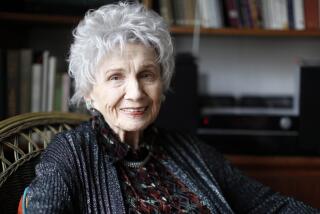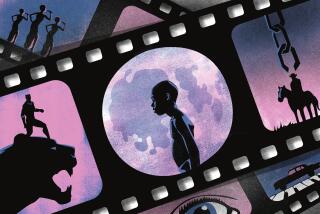Barbara Testa, Hollywood librarian who found ‘Huck Finn’ manuscript in her attic, dies at 91
Barbara Testa had enjoyed a perfectly anonymous life in Hollywood until she crawled up in the attic one day and opened a steamer trunk left behind by her grandfather, a 19th century attorney with powerful friends.
Inside, amid the letters and ledgers James Fraser Gluck had stowed away, was a handwritten manuscript that would solve a century-old literary riddle and plunge Testa into the headlines in a mounting dispute over ownership of the precious document, the missing first half of the original copy of the “Adventures of Huckleberry Finn.”
Testa, who died Dec. 16 at the age of 91, told The Times in 1991 that she was unaware at the time that scholars had been searching for the missing half of Mark Twain’s beloved story for decades or that the second half of the manuscript was housed, under the author’s directions, at the Buffalo and Erie County Public Library.
“It just looks like a manuscript,” Testa said after her discovery. “Its pages are pretty old,” but the words — scrawled in black ink — were legible.
While Testa waited for the auction house Sotheby’s to authenticate the document — and the Buffalo library pressed her to hand over the 600-page manuscript — the literary world buzzed about the discovery, anxious to see whether there were scenes or perhaps even entire characters in the original document that had been cut by the editors before “Huckleberry Finn” was first printed in 1884.
“It would certainly be the greatest literary discovery of the 20th century,” one rare book collector told The Times.
A California university professor said the discovery was much like “the British finding a working manuscript of ‘King Lear’ or ‘Hamlet.’”
Twain, who had befriended and corresponded with Testa’s grandfather, had always been casual about the whereabouts of the handwritten copy of “Huckleberry Finn.” When asked by Gluck to donate the manuscript to the Buffalo library, Twain obliged and sent along the second half of the book. But he said he couldn’t find the first half.
“The first half was copied by the pen, and when the book was finally finished, the original of that half probably went to the printers and was destroyed,” Twain explained in a letter to Gluck.
Once the manuscript was authenticated, and it was clear it could command top dollar on the open market, the Buffalo library filed suit to prevent Testa or her family from selling the document.
Testa and the library eventually settled and the manuscript headed off to Buffalo. Laura Rinaldi, Testa’s daughter, said she believes her mother got a $1-million “finder’s fee.”
Once the manuscripts were rejoined, publishers and literary experts discovered that, indeed, editors had chopped out chunks of Twain’s story, likely to cut back on the book’s considerable heft. One of the scene in the manuscript, in which Huckleberry Finn and Jim, the runaway slave, hide in a cave while discussing ghosts, was among those restored when the book was reprinted.
“Huckleberry Finn” is widely considered Twain’s masterpiece and one of the great American novels. Twain, though, preferred “The Adventures of Tom Sawyer.”
Testa credited her experience as a librarian and familiarity with Twain’s handwriting from his letters to her grandfather for making her pause when she spotted the manuscript.
“The minute I found it in the trunk, I just had a feeling,” Testa said.
Barbara Ellen Gluck Testa was born Aug. 15, 1928, in Los Angeles. Her father was a Hollywood writer, and her mother worked for Disney Studios.
Testa earned her bachelor’s degree at UCLA and taught in England. After returning to Los Angeles, she earned a master’s at now-defunct Immaculate Heart College and worked for the Los Feliz and Hollywood libraries. After suffering a stroke, she moved near Santa Cruz, where she died.
In addition to daughter Laura, she is survived by three other children, James, Louis and Catherine and a sister, Pamela. Her husband, Frank, died in 2000.
More to Read
Start your day right
Sign up for Essential California for the L.A. Times biggest news, features and recommendations in your inbox six days a week.
You may occasionally receive promotional content from the Los Angeles Times.







